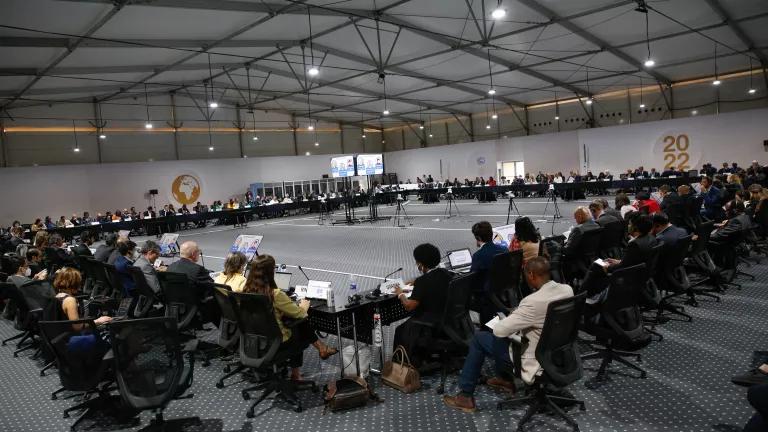The United Nations officially announced that its next major climate summit—COP26 in Glasgow, UK—will be postponed by a full year until November 2021. Despite the necessary delay due to the COVID-19 pandemic, the world cannot afford to delay climate action at the outset of the decisive decade to reduce the emissions driving the climate crisis and accelerate clean energy solutions that will build a better future for us all.
The revised summit timing serves to promote health, safety, and inclusivity for all engaged and reduce the risk of potential further delay and disruption. The guiding principle of the summit must continue to be maximizing climate ambition from leaders across society—presidents, governors, mayors, CEOs, and civil society leaders—to chart a collective path toward reducing greenhouse gas emissions to near zero by 2050 and building greater resilience.
But scaled-up ambition must also go hand-in-hand with urgently accelerated action in line with science. And the world’s foremost scientists tell us in order to be on track for the net-zero emissions by 2050 and avoid the worst impacts of climate change we need to roughly halve global emissions this decade by acting boldly now. Yet before COVID-19 global emissions were set to keep increasing through 2030, and the current drop in emissions may only be temporary if we go back to business as usual.
Under the Paris Agreement, countries committed to strengthen their climate plans in 2020 into greater alignment with the net-zero emissions goal. These strengthened climate plans should serve as the guide for countries’ COVID-19 recovery and investment strategies over the coming months in the lead up to COP26.
COVID-19 recovery strategies aligned with the Paris Agreement can create more and higher-quality jobs and stimulate stronger economic growth. For example, the European Union’s proposed $825 billion recovery package announced this week allocates 25% of total funding toward climate action. It aligns recovery spending with the recently announced European Green Deal as an engine for innovation, prosperity, and resilience and to become the first climate neutral continent in the world. Specific proposals in the plan include making buildings more energy efficient, expanding low carbon vehicles, and assisting workers in the transition to a low carbon economy. The recovery plan also links to the EU's strengthened climate plan to reduce emissions by at least 50-55% by 2030 from 1990 levels expected to be finalized in the coming months.
Meanwhile in China, which is not setting a GDP growth target for the first time in decades, the government has an opportunity to boost employment through investments in new and clean infrastructure. China’s stimulus measures can prioritize investing in low-carbon, “shovel ready” electric vehicle infrastructure and renewable energy and energy efficiency projects that offer high rates of employment. Such an approach would also avoid investing in excess industrial capacity and reduce the risk of stranded assets such as coal plants that may need to be retired before they can recoup their costs—especially given that renewable energy is now cheaper than both operating and new coal power in China.
The European Union and China can work to define strategies for a green and resilient recovery and strengthened national climate plans through a major EU-China summit scheduled for this September, and which can also set the tone for other countries’ enhanced actions in the lead up to COP26.
In India, economic stimulus measures must simultaneously address the three crises facing the country—health, economic, and climate. This should include sector specific stimulus measures that support and incentivize sustainable development and green investments. The imperative to invest in greater resilience was highlighted starkly last week by the worst cyclone eastern India has seen in over a century destroying homes and livelihoods even as people were seeking to stay physically isolated due to COVID-19.
And finally, in the U.S. stimulus measures must ensure economic security—especially for small businesses that promote a cleaner and more resilient future—rather than giving blank check bail outs to the fossil fuel industry that harms public health and exacerbates the climate crisis. Recent analysis shows that a bold economic renewal plan could create 9 million new jobs every year for a decade to power the American clean energy economy and manufacturing. However, the international knock-on effects of second term for President Trump could delay global emissions reductions by up to a decade – precisely during the critical window we need to be sprinting ahead. A new U.S. administration could be a game changer in linking economic recovery to stronger climate action as well as using its diplomatic and economic heft to secure stronger climate plans from major emitters in the lead up to COP26.
It is becoming increasingly evident that action on climate change will propel a stronger and more inclusive economic recovery. Leading economists, including several Nobel laureates, recently published a review of 700 stimulus measures from the great recession with insights from over 200 economic experts. They identified five policies that have both a strong economic multiplier effect and spur progress toward net-zero emissions, including clean infrastructure, building efficiency retrofits, investment in education and training, natural climate solutions such as restoring ecosystems, and clean research and development.
These are the types of investments that countries must prioritize in their economic recovery plans now in order to stand any chance of halving global emissions this decade. We have seen governments across the world rapidly mobilize to tackle COVID-19, demonstrating that we are able to commit the necessary resources and political will to combat global challenges such as climate change. We must act boldly and resolutely together to ensure this is the decisive decade to build the cleaner, more equitable and resilient world we need and our children and future generations deserve.




